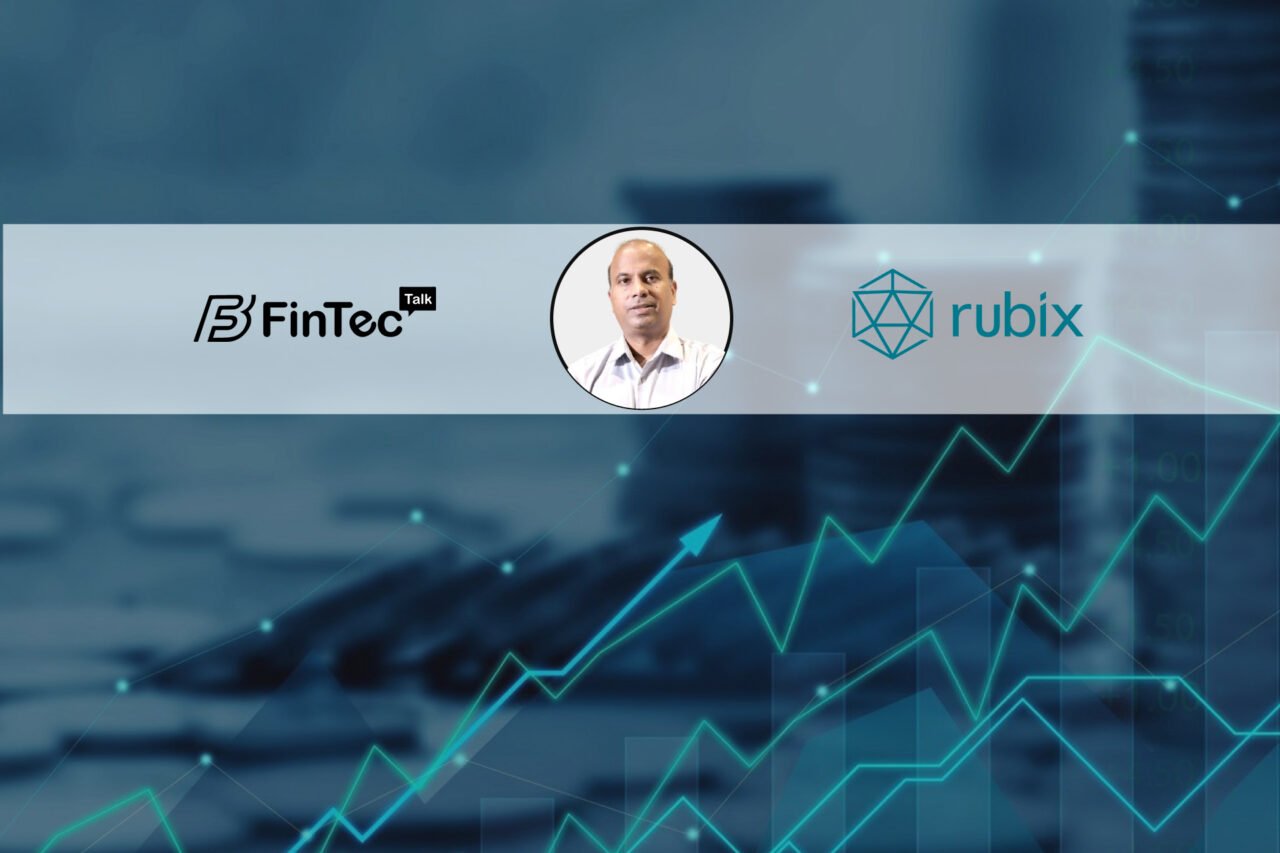The financial sector is ripe for disruption. Government & private financial institutions have perpetuated inequality. What are the tech trends shaping the finance space?

KC Reddy,Founder and Chief Architect, Rubix's
KC Reddy is the founder & chief architect of Rubix blockchain protocol. In addition to his work in blockchains, KC has also worked for a decade in building cyber security business focused on Identity & Access Management and applied cryptography. Apart from leading technology teams, KC has 15 years experience in investment research & hedge funds with extensive focus on technology investing around the world. He has worked in senior roles at Barings, ABN Amro, Nevsky Capital & Credit Agricole. KC is an MBA from the Indian Institute of Management, Kolkata & has Bachelors of Engineering in Computer Sciences.
1. Can you tell us more about yourself and your career before Rubix?
Currently, I am the founder & chief architect of the Rubix blockchain protocol. Prior to founding Rubix in 2017, I spent a decade building a cyber security business focused on identity, access management, and applied cryptography. I am also a technology investor and have spent the last 15 years working in investment research and at hedge funds with an extensive focus on technology investing around the world. I have worked at companies including Barings, ABN Amro, Nevsky Capital and Credit Agricole and have an MBA from the Indian Institute of Management, Kolkata and a Bachelors of Engineering in Computer Sciences.
2. How did you get your start in the field of Finance?
After graduating with a degree in computer science, the logical next step would have been to start my career as a programmer. This was the route my entire class was taking, however, this inspired me to differentiate myself. Thanks to this, I ended up doing my MBA in finance. Finance was an easy choice because I have always had a passion and aptitude for numbers. Interestingly enough, as I pursued my MBA it became clear to me how computer science, finance and economics (another topic I became quite interested in while pursuing my MBA) are interrelated and needed an appreciation for abstraction. During the past three decades I have benefited greatly from this moment of clarity including understanding Web3 and Blockchain as they are a perfect blend of computer science, finance and economics.
3. Could you tell us more about Rubix and what was the inspiration behind starting this company?
Rubix is a community, first and foremost, powered by a breakthrough green blockchain technology protocol for peer-to-peer data transfer and transactions. While Rubix is a relatively young blockchain, the platform is extremely robust. We’re a quickly growing community currently valued at more than $1 billion. Along with our green architecture and secure system, what sets Rubix apart is that our blockchain can be leveraged through Web3 and Web5 to solve the world’s biggest problems, including climate change (specifically to help companies set and meet ESG goals) and income inequality.
I became inspired to build Rubix during my time as a tech investor at various global investment houses. There, I observed and was able to fully appreciate the economic and societal impact blockchains deliver. Additionally, I have been working on cutting edge cyber security and applied cryptography solutions since 2011. My team and I wanted to leverage our understanding of cryptography to solve some of the deep data privacy and security issues we saw in the current centralized data world. From there, our solution, Rubix was born!
4. What’s your favorite part about working in the industry?
The uncertainty and opportunities offered by the Web3 industry is why I am so excited about working in this space. I get to think about how to solve the next problem that comes my way while knowing that all my assumptions can be disproven at any moment. Though I have experienced multiple moments of uncertainty over three decades, the experience with Web3 is quite different as I now have the ability to innovate and offer solutions to eliminate those uncertainties. For example, when the industry faced another moment of uncertainty with the US sanctioning Tornado Cash, I felt good about how Rubix is designed to avoid this, particularly well before the sanctions were made. I love the thrill of playing in this space and having an opportunity to help so many people, particularly those who are yet to build their wealth..
5. What makes Rubix unique? How does it stand out from its competitors?
Rubix is the first green blockchain platform in the world and we prioritize energy efficiency in our operations. Rather than using Proof-of-Work or Proof-of-Stake protocols used by most major blockchains (both of which are energy-intensive and result in significant storage inefficiencies because they require every node to store an entire transaction history), we’ve created Proof-of-Pledge, where each transaction achieves finality on its own without waiting to be pooled with unrelated transactions and so the network doesn’t require expensive or energy-intensive miners. This is much less storage-intensive and energy-intensive than the alternative methods.
Many blockchain users cite scale, cost and privacy concerns associated with more mainstream blockchains. We created Rubix on a decentralized architecture to address these and the other many issues traditional blockchains face.
Additionally, monolithic chains like Ethereum all scale vertically, while Rubix scales horizontally with parallelism. Thanks to this unique subnet architecture, we are helping to bring one billion nodes onto Web3.
6. What according to you are blockchain’s potential applications in the financial sector?
The financial sector is ripe for disruption. For far too long, financial institutions in both government and private sectors have perpetuated systems of inequality. The solution? Adopting decentralized blockchain technology platforms like Rubix. Blockchain technology can increase security and transparency in financial systems, and gives ownership back to people who have been traditionally left out of the decision making process. There is no pre-approval process or credit score check with digital wallets, which have historically been used to disenfranchise members of our community.
For starters, with blockchain technology, payments could be instantly and securely transferred between parties, avoiding long wait times that usually come along with transfers between institutions like banks. Blockchain’s applications in fintech will also improve user experience, reduce risk and make operations more efficient.
7. How do you plan to leverage Web3 technology to develop the blockchain?
Web3 prioritizes putting the user back in control. In the same way, blockchain is built on a peer-to-peer network where users are the validators, eliminating the need for large institutions that have for too long stifled creativity, ownership, innovation, and freedom.
Blockchain is the cornerstone of Web3. I believe Web3 is the future of the internet, one built on blockchain technology where cryptocurrencies, NFT’s, and DAO’s thrive. The ideals of Web3 continue to drive the Rubix team and I forward. We are proud that Rubix is built on a truly decentralized platform and that Rubix addresses many of the concerns about Web2. For example, in order to improve data security, scalability and privacy, users must utilize decentralized identity solutions as they transition to Web3 technology. Web3 decentralized identity solutions offer users increased safety and control over their data. Decentralized identity systems allow you to control your online identity and personal information. In Web3, you get more fine-tuned control over what information is available about you online and who can access it.
Because of this, Rubix has already established DiDs to ensure users security as we transition to Web3.
8. Could you give a sneak peek into the recent developments at Rubix?
Earlier this summer, we updated the platform to “Rubix 2.1: Eismeer” which transforms the way tokens are used on our platform. Now, there are faster token transfers, more accurate tracking of token transfers, enhanced authentication and verification and a more rigorous process for mining. All of these improvements and more will help Rubix’s speed and ability to continue running smoothly.
9. How do you think technology is changing the financial services business landscape? What are some big technological shifts/trends you expect to take place in the next 5-10 years?
As I alluded to above, I predict massive changes happening in the financial services industry over the next 5 to10 years. Just look at the last 10 years and the rise of services like Venmo, Stripe, Klarna, etc. We are seeing applications, like PayPal, allow consumers to directly send money to their peers and have their own wallets within the app.
Consumers seem to like being able to take back control of their finances and not have to open an account through a big bank.
But blockchain brings this concept a step further, where digital wallets have no transaction fees and the account is truly in the hands of the consumer. I believe the industry is evolving because consumers want change and recognize that traditional systems have failed to serve them.
As more and more people migrate to Web3, I expect an increased adoption of blockchain based cryptocurrencies and decentralized finance, more commonly referred to as DeFi. DeFi refers to a global financial system available on public blockchains. With DeFi, only the user has full access and control to their money, there are no banks or funds. DeFi removes intermediaries and relies on smart contracts to replace the financial systems it does not rely on. Through smart contracts money is programmed to perform various functions and has the terms of agreement between the buyer and seller written into the code.
10. What are Rubix’s plans for expansion and growth? Where do you see it in the coming years?
Rubix just celebrated it’s one year anniversary of going live on the main net and in just one year we’ve accomplished so much. I am continually inspired by our team.
Just last month, we announced a $100M investment from LDA Capital. This funding is a catalyst for Rubix; it allows us to continue growing our global ecosystem and community with the end goal of creating a better and greener world through Web3. You will be seeing more from us in the coming months!
In the years to come I hope Rubix continues to demonstrate that blockchain technology is a force for good, particularly in the fight against the climate crisis. With Rubix’s blockchain technology, brands and supply chain networks can successfully build transparent and verifiable ESG programs.
We are also looking forward to growing our number of partnerships. We are lucky to work with industry leading organizations like FINAO, YMCA, Trst01, Krista Software, Jupiter Meta, EVVO Labs, Ninestars and Promantus. We are also excited about our recent partnership with Global Goals Week to accelerate the process on the UN’s Sustainable Development Goals.
11. Where do your passions lie? What do you think defines you as a person?
My passions lie in making meaningful contributions to society through both my professional and personal endeavors. My values define me as a person. I believe in being honest, fair, generous, logical and collaborative. I respect and value other people’s contributions and strive to lead a joy filled life amidst all the uncertainties and perpetual market cycles that I tackle every day.
12. What is the most significant piece of advice you would want to give to company leaders?
Take a leap of faith. With COVID in particular, people and businesses around the world have experienced an unprecedented number of challenges. As a business leader, you must rise to the occasion during turbulent times like COVID and keep pushing through and innovating. Push the boundaries with things like Web3. Learn, test and play with Web3 as you will never know what you will innovate next.
For more such Updates Log on to https://fintecbuzz.com/ Follow us on Google News Fintech News

